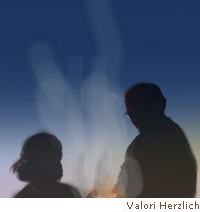Michael Cantor
At Plum Island, 9/28/01
Dust, smoke, hats, flags, voices, noise
The set is on all day, there are no commercials.
I soak the last garlic greens from my wife’s garden
in water from the sea
set them steaming on a hot grill
layer on thin half moons of bright lemon
fresh black trout, quickly cleaned and gutted,
their mouths and eyes open,
tuck ears of buttered corn between the fish
and cast handfuls of coarse sea salt over it all.
As I close the lid on the Weber
I think of the Shinto priest almost forty years ago
blessing the new factory at Totsuka
droning, in a stiff white kimono
scattering handfuls of salt to the wind
purifying
and of sumo wrestlers,
giant Kashiwado with the pimpled ass,
my favorite,
throwing salt as they glowered at each other.
It will all be finished in ten minutes
the greens dry and charred, ashes
the trout cooked through, moist and tender
some of the corn kernels scorched and caramelized.
I will make a quick ponzu sauce
shoyu and lemon juice and rice vinegar.
A salad is ready, slivered fennel and shitaké
smelling of earth
focaccia for the Friday evening blessing.
And my wife and I will light candles, say prayers,
pluck all the trout flesh from the bones,
she delicately, using knife and fork
in the European style; I with my fingers
and drink much too much white wine,
go to bed very early.
She will try to dream of her daughter, in the hills past Santa Fe,
and I of priests and sumo wrestlers,
They have begun to pull down the steel cathedral
the filigree of death
soon there will be only a hole.
“At Plum Island” was previously published in Manzanita Quarterly.
Companion Piece
Every poet I know appeared to want — to have — to write a 9/11 poem, and this one, with its deliberately oblique approach, was mine.
After the initial shock and horror, my wife and I retreated within ourselves. There was an unspoken attempt to live quietly, to treat each other well, to snuggle in and hide from the ugliness of the world. Santa Fe, where we spend part of each year; secluded, emotionally and physically distanced from all this, cocooned by mountains; seemed to call. And aspects of religion arose — not the mad God-worship that led to 9/11, but a more basic contemplation, a search for an inner calm, an attempt to escape to and focus on the most basic elements that surrounded us on Plum Island: sand, sea, salt, sea grass.
At the same time, we could not ignore the real world. The radio was on continuously, three newspapers arrived each morning, we watched TV all night.
The poem is an attempt to present this as flatly as possible, to bring truths through the facts of our lives and thoughts rather than statements, to attempt to demonstrate — without explicitly saying so — how the sight of charred flesh on a grilled fish can be enormously disturbing, even as the act of preparation, and joining in a somewhat ritualistic dinner, can be comforting. I believe that political and moral poetry succeeds best through presentation and understatement, through allowing the reader to enter the poem and complete the thoughts, and while my poetry doesn’t always follow my own beliefs, this one does.
Technically, I feel that the poem flows and reads well, but I don’t know if it succeeds in the goal of bringing the reader inside my head, sharing my half-real/half-suppressed thoughts and emotions. Poetry on events of this nature is so difficult, although it can be done (“A Refusal to Mourn the Death, by Fire, of a Child in London”). What I did not want was another Oh my God, they’re jumping out of windows! cry. I wanted the reader to enter the poem as neutral ground, to go where he or she felt. In doing this — speaking technically again — I may have gone too far. When I first workshopped this at the Powow group, almost nobody realized it was a 9/11 poem, and it was taken by most as a somewhat unfocused depiction of a domestic situation. (I don’t believe the italicized “signposts” at the beginning and end were there then. I had felt that the dating in the title would be sufficient to place the poem.) The present version is more explicit. Ideally, I would like to eliminate the signposts, but — particularly as time passes — I’m not certain the poem works as intended without them.
Michael Cantor, New York-born, and a former business executive, has lived and worked in Japan, Europe and Latin America; and now resides on Plum Island, north of Boston on the Massachusetts coast. His poetry has appeared in Measure, The Formalist, Dark Horse, Iambs & Trochees, Texas Poetry Journal, The Atlanta Review, and many other journals and anthologies.
Valori Herzlich was born in Latvia, and educated in New York City. She has worked as an art director, designer and illustrator; and is presently very much occupied with Plum Island’s most varied and prolific herb and vegetable garden.
|